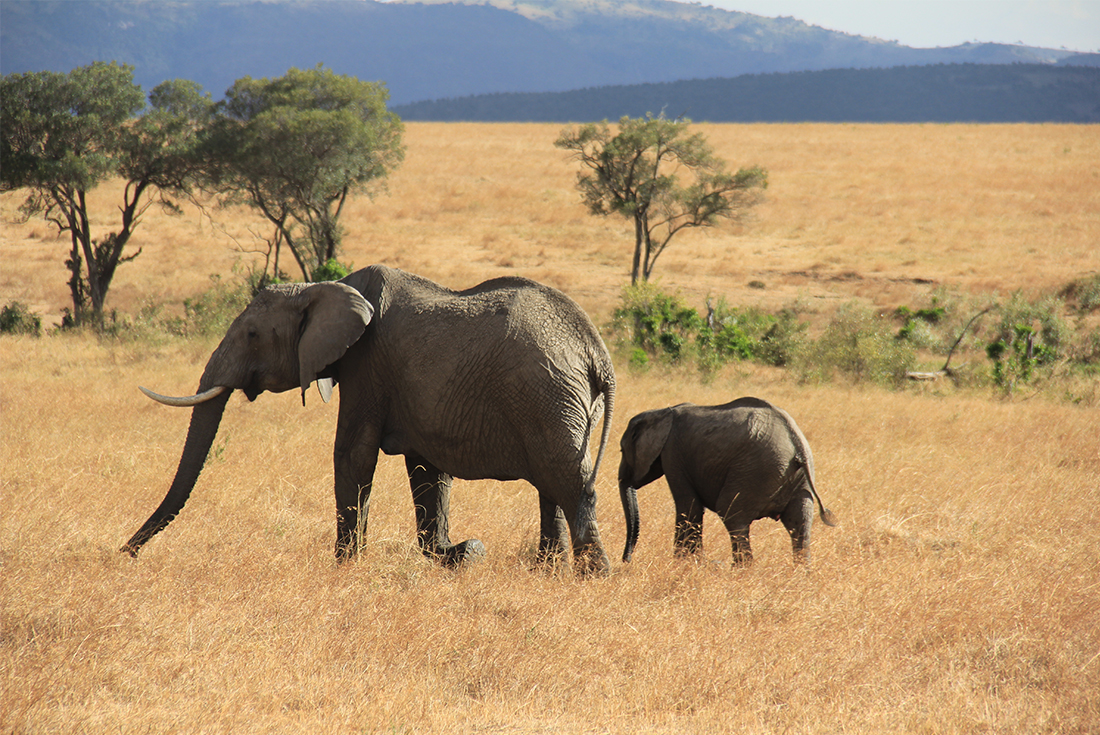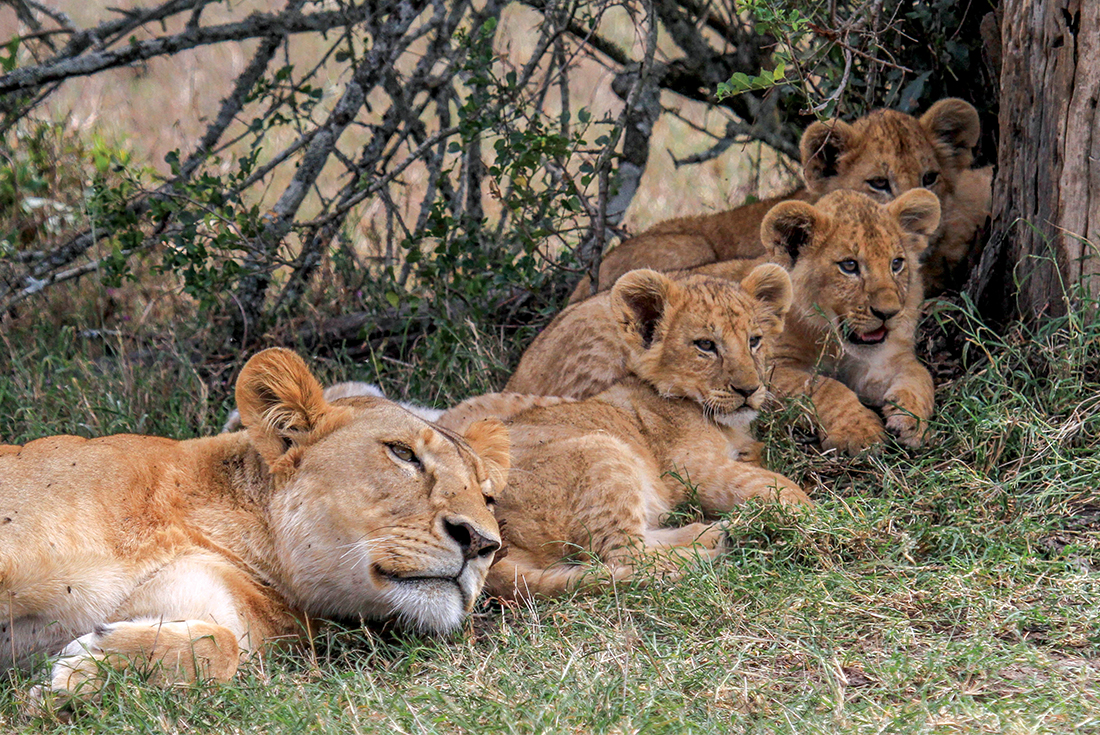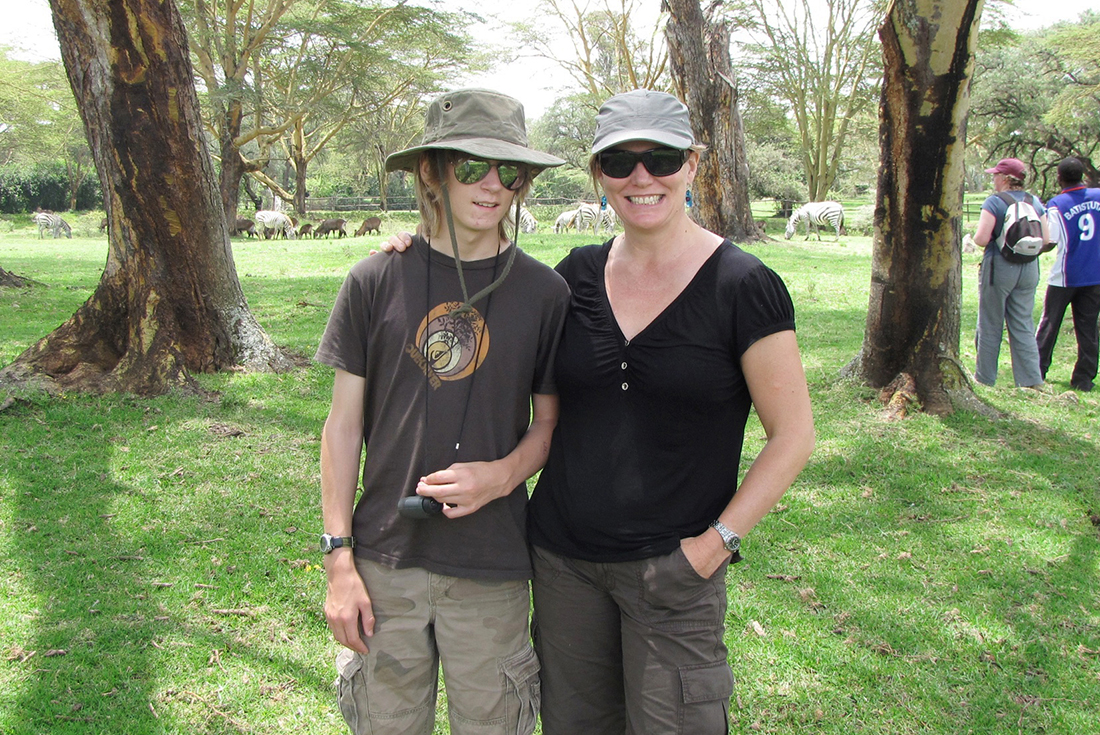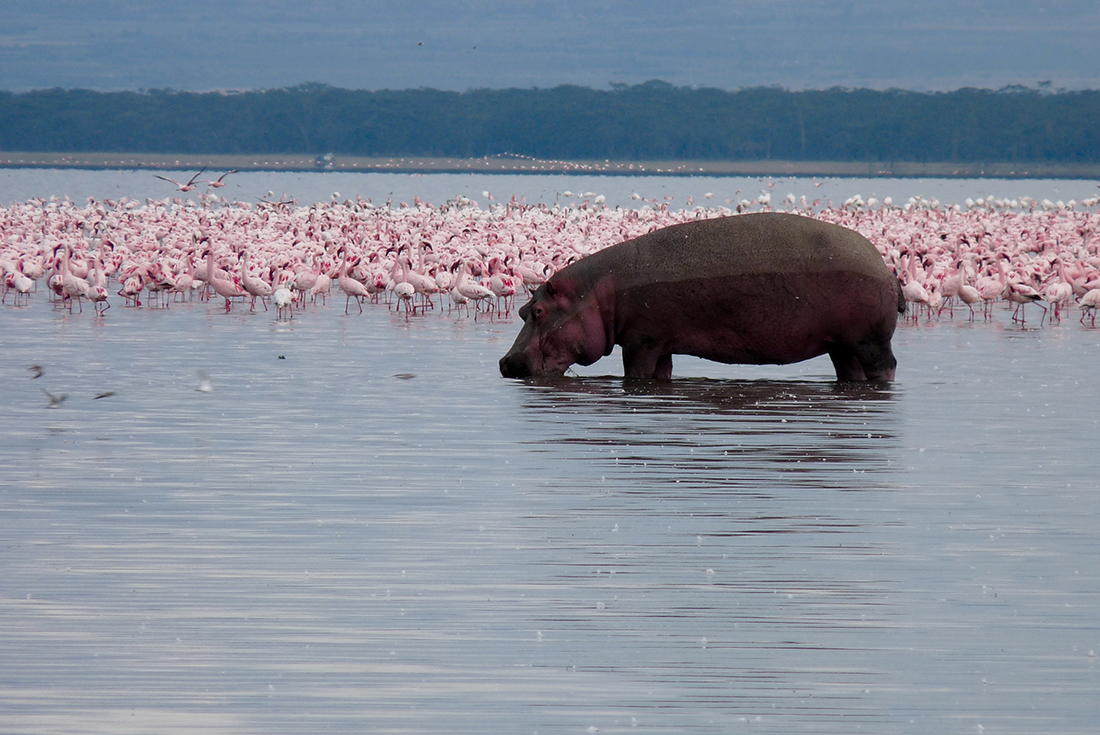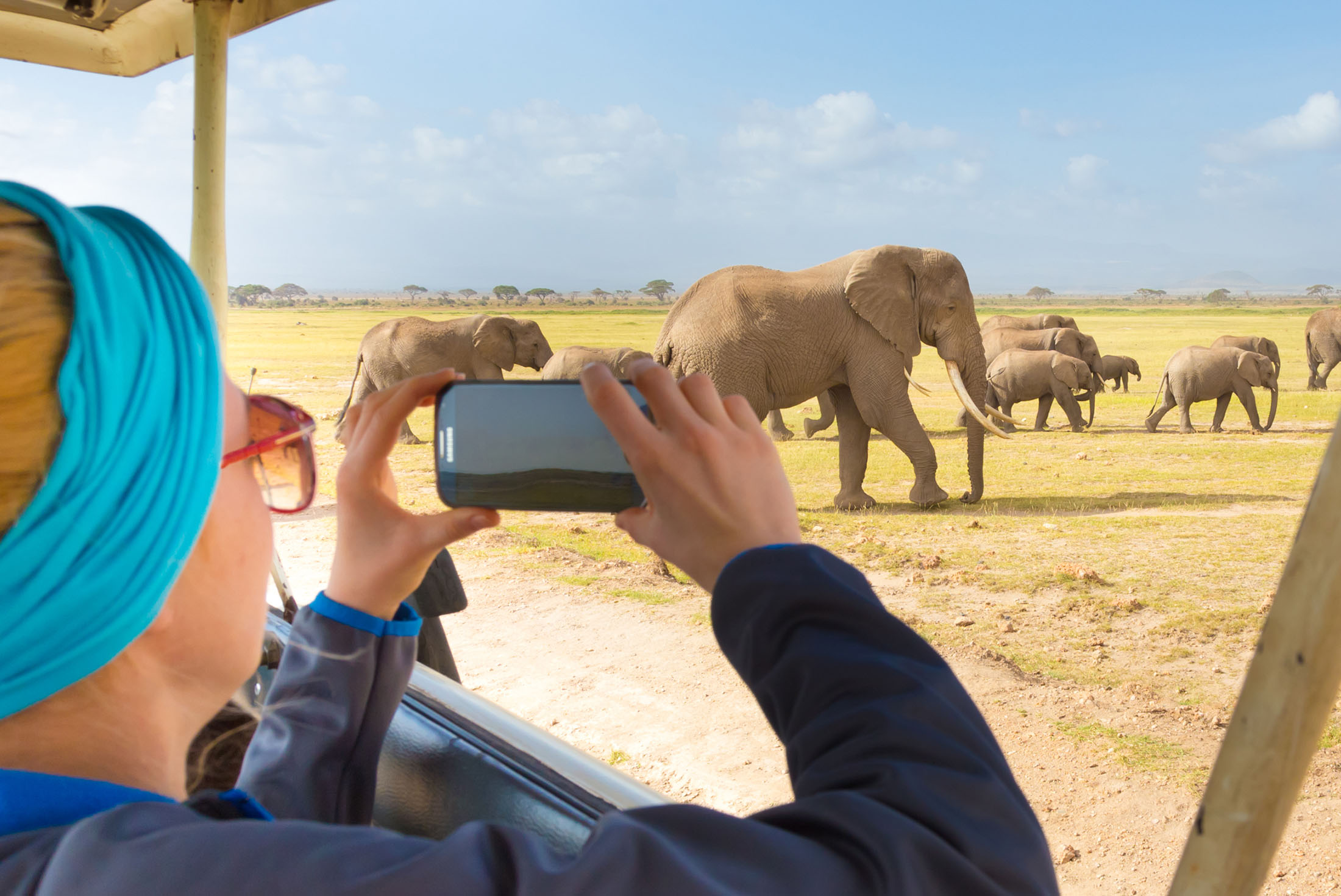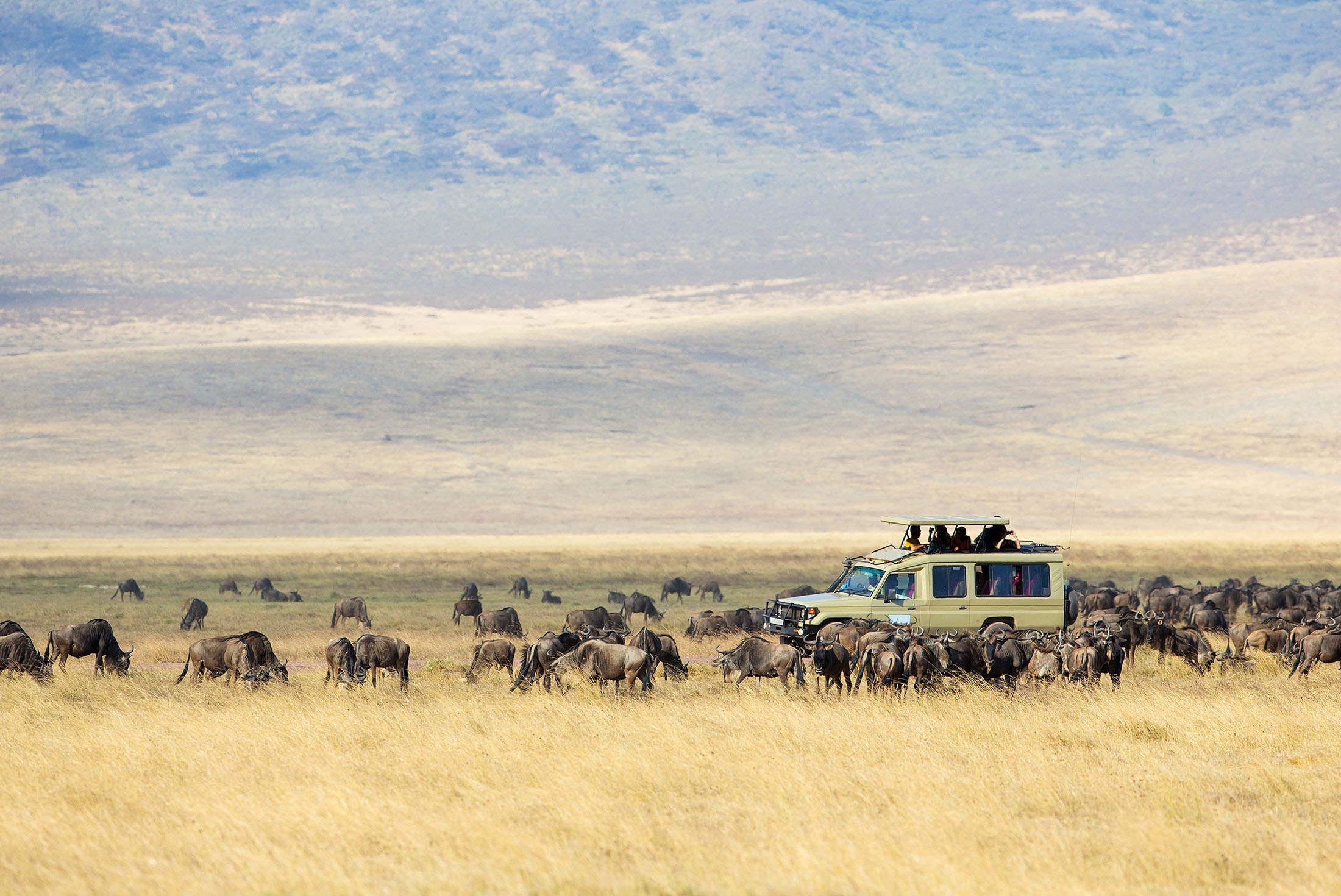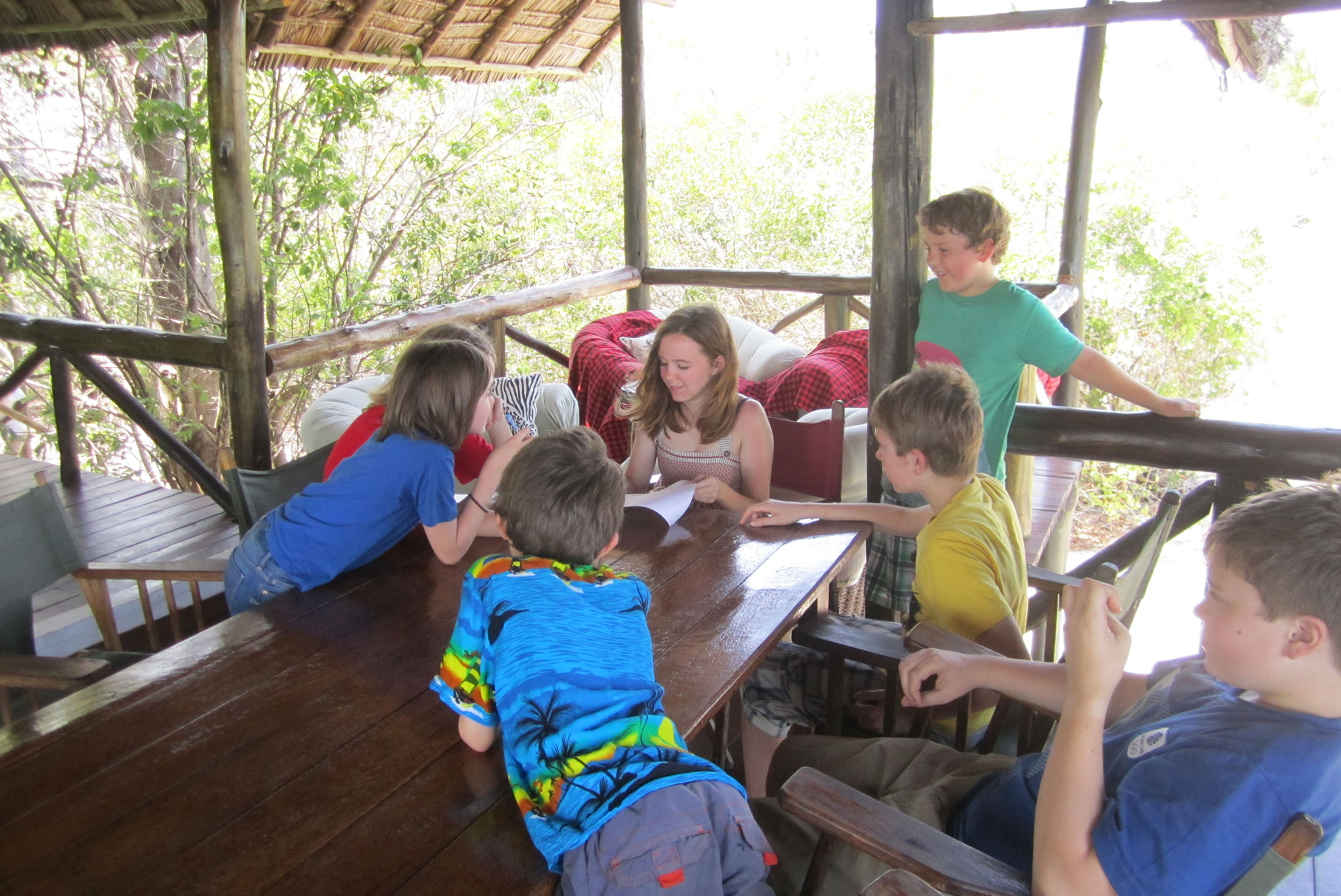- Meet some Maasai Mamas (the name for women artisans in Tanzania) and learn about their village life, including how to prepare a local Swahili dish.
- Encounter roaring lions and magnificent zebra in the famous Serengeti National Park as our small safari vehicles get you close to the action in this spectacular wildlife arena.
- Keep your eyes peeled for black and white rhinos on an adventure through Lake Nakuru National Park
- Make friends with warriors of the Maasai tribe around the camp fire; they'll be on guard for lions while you and your family camp overnight
- Venture into the incredible Masai Mara National Reserve for a full-day game drive
04 Jul 2023
Kenya and Tanzania Family Safari
YGFAC
Validity: 01 Jan 2023 to 31 Dec 2023
Experience East Africa with your family as you discover the wildlife, history, people, culture and beauty that spans across this incredible landscape. Roam the famous Serengeti National Park, nearly 15,000 sq km of rolling savanna that shelters an astounding array of animals, from miniature dik-dik antelopes to the noble African elephant. Spot wildlife while taking in mind-blowing views from the edge of Ngorongoro Crater and listen to the sounds of the African night in a thrilling camping experience. This is also a human journey that puts you in the heart of the valleys once inhabited by some of humankind's earliest ancestors – where you’ll have the opportunity to learn from the Maasai community – hear about the customs and traditions of village life and even prepare a local Swahili dish. If you’re looking for a family adventure full of friendly folk and some of the best game-viewing in Africa, then this will truly be a trip to remember!
Basix
Family
Overland vehicle,4x4 Safari Vehicle
2
The Heron Portico
Opposite Provincial Police Headquarters, Milimani Road, Milimani, Nairobi, Kenya
Nairobi
KENYA
Phone: 254 020 272 0740
The Heron Portico is a charming 3-star hotel set in a prime location in the centre of Nairobi. Local tourist attractions such as Uhuru Park, Central Park and Kenyatta Mausoleum are not far from the hotel. Also easily within reach are the National Assembly Building and the Parliament Building. The hotel's facilities include an outdoor swimming pool, sauna, steam room, coffee shop and cafe, WiFi (at a surcharge), a gift shop and a 24 hour front desk. Guest room facilities include TV with satellite channels, in room safe, tea and coffee making facilities. The hotel is located 18kms from the Jomo Kenyatta International Airport.
A private arrival transfer is available for pre-booking through Intrepid. Please speak to your booking agent for more information. If you have pre-booked an arrival transfer, please ensure you have provided Intrepid with your arrival flight details at least 15 days before the departure of your Intrepid trip. On arrival, please look out for our representative holding a board with your name at the arrival terminal. If you fail to see our representative, please walk to the Grand Voyage Travel Agency Desk which is located at the left side of the arrival terminal and request your transfer. Grand Voyage Travel Agency: Tel: +254 722-717336 / +254 722-260627 Or +254 733 523 813 If you are making your own way to the hotel, there is a taxi stand outside the airport building. A taxi should cost approximately USD$50 to USD$70, and must be paid in Kenyan Shillings.
The Heron Portico Hotel
Milimani Road Milimani
Nairobi
Nairobi
KENYA
Phone: +254 0202720740
The Heron Portico is a charming 3-star hotel set in a prime location in the centre of Nairobi. Local tourist attractions such as Uhuru Park, Central Park and Kenyatta Mausoleum are not far from the hotel. Also easily within reach are the National Assembly Building and the Parliament Building. The hotel's facilities include an outdoor swimming pool, sauna, steam room, coffee shop and cafe, WiFi (at a surcharge), a gift shop and a 24 hour front desk. Guest room facilities include TV with satellite channels, in room safe, tea and coffee making facilities. The hotel is located 18kms from the Jomo Kenyatta International Airport.
Private departure transfers are available for pre-booking through Intrepid. Please speak to your booking agent for more information. If you have pre-booked a departure transfer, please ensure you have provided Intrepid with your departure flight details at least 15 days before the departure of your Intrepid trip. It is also possible to book a taxi to the airport via the Heron Portico - please inquire at the reception. The price will be approximately USD$50 to USD$70 and must be paid in Kenyan Shillings.
Travellers on Intrepid trips that start on or before 31 December 2022 are required to produce proof of full vaccination against COVID-19. Learn more about Intrepid’s COVID-19 policy. 1. A single supplement is available if you’d prefer not to share a room on this trip. The single supplement applies to all nights of your trip and is subject to availability. Please speak to your booking agent for further information. 2. Please note that these trips are for adults and children travelling together and there must be at least one child under 18 with you. 3. Minimum age for children on this trip is 5 years old. 4. A discount of 10% applies on this trip to children 17 years and under at time of travel.
All Intrepid Family trips are accompanied by one of our group leaders. The aim of the group leader is to assist your family to take the hassle out of your travels and help you have the best trip possible. Your leader will provide information on the places you are travelling through, offer suggestions for fun things to do and see - for both kids and parents, recommend great local eating venues that will even get the kids trying new things, and introduce you to our local friends. While not being guides in the traditional sense you can expect them to have a broad general knowledge of the countries visited on the trip, including historical, cultural, religious and social aspects. Our leaders are not babysitters on this trip - we leave that to you (the experts), but they will make sure that group members of all ages are able to explore their destination safely and with as much fun as possible. Our group leaders are not responsible for looking after children at any time and children must be accompanied by a parent or guardian at all times throughout this itinerary.
https://www.intrepidtravel.com/safety-guidelines
PASSPORT You’ll need a valid passport to travel internationally and most countries require your passport to have a minimum of 6 months validity, so remember to check the expiry date. We need your passport information to get everything ready for your trip so it’s important that the information on your booking matches your passport exactly. Please take care to provide the correct details. We recommend carrying a copy of the photo page of your passport while travelling and leaving a copy at home with family or friends. VISAS Many countries require a visa and obtaining the correct visa is your responsibility. We recommend you check your visa requirements as soon as you have booked your trip. This will ensure you have time to prepare your documents and for your visa application to be processed. Entry requirements can change and are different depending on your nationality. Please refer to your government's foreign travel advisories, the consular websites for the countries you’re travelling to and those you may transit through. Always follow visa advice from official websites; not all visa information found online may be valid. You can also head to Intrepid’s Entry & Health requirement page to get the latest information on travel documents and visa requirements, plus local government COVID-19 vaccination and quarantine policies: https://www.intrepidtravel.com/au/visa-health-requirements
Meet some Maasai Mamas (the name for women artisans in Tanzania) and learn about their village life, including how to prepare a local Swahili dish.
Encounter roaring lions and magnificent zebra in the famous Serengeti National Park as our small safari vehicles get you close to the action in this spectacular wildlife arena.
Keep your eyes peeled for black and white rhinos on an adventure through Lake Nakuru National Park
Make friends with warriors of the Maasai tribe around the camp fire; they'll be on guard for lions while you and your family camp overnight
Venture into the incredible Masai Mara National Reserve for a full-day game drive
Please take into consideration if you are travelling with younger children that the going can be slow over the long distances and often bumpy roads. A little bit of patience will go a long way towards your enjoyment of this beautiful land! Some days have driving times of 6-7 hours. Furthermore there will be early mornings, when Africa is at its best. This is a participatory camping trip and everyone will embrace the team spirit by helping with camp setup, food preparation and cleaning. You and your family will be putting up and taking down your tent as you move from place to place. In Loita Hills (Day 13) you will stay in a bush camp with no shower facilities. The rewards of experiencing the Maasai culture, however, should more than make up for the lack of creature comforts. Our purpose-built overland vehicles allow for excellent game viewing, equipped with large sliding windows. They have no air-conditioning, however, so they can get dusty and hot at times. Please consider the season and research the weather conditions. Remember to come prepared with adequate clothing.
GENERAL HEALTH All travellers need to be in good physical health in order to participate fully on this trip. When selecting your trip please make sure you have read through the itinerary carefully and assess your ability to manage and enjoy our style of travel. Please note that if in the opinion of our group leader or local guide any traveller is unable to complete the itinerary without undue risk to themselves and/or the rest of the group, we reserve the right to exclude them from all or part of a trip without refund. You should consult your doctor for up-to-date medical travel information or for any necessary vaccinations before departure. We recommend that you carry a first aid kit as well as any personal medical requirements in their original packaging as they may not easily be obtained while travelling. COVID-19 The safety and wellbeing of our travellers, leaders, crew, staff, and suppliers continues to remain our highest priority as we travel. You can read more about how we will keep you safe on our trips, including our COVID-19 Health & Safety Guidelines here: https://www.intrepidtravel.com/safe-travels VACCINATION POLICY From 1 January 2023, Intrepid will no longer require travellers to provide proof of vaccination against COVID-19 for this trip. However, we continue to strongly recommend that all travellers get vaccinated to protect themselves and others. Specific proof of testing or vaccination may still be required by your destination or airline. Please ensure you check travel and entry requirements carefully. For more information, including a detailed FAQ about this policy, please visit https://www.intrepidtravel.com/covid19. HEALTH SCREENING If you are unwell prior to travelling, please stay at home and contact us to make alternative arrangements. From 1 January 2023, Intrepid will no longer require travellers to complete a self-screening health form at the group meeting for this trip. If you are displaying any COVID-19 symptoms or have any health concerns during the trip, we will follow the advice of local health authorities to determine whether medical assistance, isolation or further action is required. Travellers who test positive while taking part in an Intrepid trip will need to leave the group for a minimum of five days and may only rejoin the group if presenting as asymptomatic – our team will assist them in arranging a place to self-isolate and any onward journey. It's quite possible that the destination country may have different or more strict protocols than your home country regarding COVID-19. This may include hotel or hospital quarantine or quarantine for the group. Please check your government's travel advice or contact the closest embassies to find out the details. We ask all travellers to continue to monitor their health throughout their travels and report any relevant symptoms to their tour leader.
By travelling on an Overland trip you have chosen a participation camping tour. This means that you will be helping your cook prepare meals for the group. You may also get the chance to help with the shopping. Your cook will come up with meal ideas and quantities needed for large groups. Participating in the camp is usually done on a duty roster system with group of 5 or 6 people (depending on group size) having a different camp job each day. If you have any dietary requirements please tell us at the time of booking, and also remind your crew at your welcome meeting. A typical camp breakfast might be toast with spreads, cereal, something hot such as eggs or pancakes, as well as tea and coffee. Lunch is almost always a sandwich with healthy salad and assorted fillings, sometimes with fruit to follow. On occasion there will be the opportunity to buy your lunch to allow you try the local cuisine or provide some variety to sandwiches. Dinner might be a BBQ, rice dish or pasta dish and there is always the chance to try some African food such as ugali and stew. Your overland truck has a tank of treated water that is safe to drink. Your crew will use this to cook and provide cordial at meal times. Please do not hesitate to use this water to minimise the consumption of plastic water bottles. Soft drinks and alcoholic beverages are not part of included meals. One thing is sure - you definitely won't go hungry or lose weight on your safari! When you aren't camping you will have the freedom to decide where, what and with whom you eat.
If you're happy with the services provided a tip - though not compulsory - is appropriate. While it may not be customary to you, it's of great significance to the people who will take care of you during your travels, inspires excellent service, and is an entrenched feature of the tourism industry across many Peregrine destinations. The following amounts are per person suggestions based on local considerations and feedback from our past travellers: Restaurants: Local markets and basic restaurants - round your bill up to the nearest US$1. More up-market restaurants we suggest 10% to 15% of your bill. Local guides: Throughout your trip you may at times have a local guide in addition to your tour leader. We suggest US$2-US$3 per day for local guides. Drivers: You may have a range of drivers on your trip. Some may be with you for a short journey while others may be with you for several days. We would suggest a higher tip for those more involved with the group, however we suggest US$1-US$2 per day for drivers. Your Tour Leader/Safari Leader: You may also consider tipping your tour leader/safari leader for outstanding service throughout your trip. The amount is entirely a personal preference, however as a guideline US$4-US$5 per person, per day can be used. Of course you are free to tip more or less as you see fit, depending on your perception of service quality and the length of your trip. In total, we recommend you budget approx US$7-US$12 per day of your trip to cover tipping. Over the years we have found that many of our travellers find the need for tipping to be both tiresome and embarrassing, especially if they don't have the correct small change. To overcome this, we have established a tipping kitty system. At your group meeting, your tour leader may discuss the idea of running a group tipping kitty, whereby everybody contributes an equal amount and then your tour leader pays the tips while keeping a running record of all monies spent (except restaurant tips). The record can be checked at any time and any money remaining at the end of the tour returned to group members. Please don't tip with coins, very small denomination notes, or dirty and ripped notes. This is regarded culturally as an insult.
CLOTHING: You will need to bring a mixture of lightweight clothing, some warm items for the evenings, and long shirts and pants for protection against mosquitoes particularly if you are in a malaria zone. Clothes should be easy to wash and dry. Some people like to take jeans for evenings out but they can be tough to dry and should not be used for trekking. Avoid nylon and other synthetics, which can be very uncomfortable in hot weather. Ex-military or military style clothing and equipment is NOT recommended.
BATTERIES/POWER: Most of our trips have access to power to recharge batteries for phones and cameras every couple of days. We always recommend that you carry an extra battery for your camera just in case. Your vehicle will be equipped with a 12 volt “cigarette lighter” socket which may be used at the crew’s discretion, however, do bear in mind that only one piece of equipment can be charged at a time and it will not be allowed if there is a risk of running the vehicle’s batteries low. Batteries may also be recharged from hotel room wall sockets. Hotels and many campsites have electricity and charging of batteries is advised before checking out the following day.
What you need to bring will vary according to the trip style you have chosen, the countries you are visiting and when you are travelling. Generally speaking, we recommend you pack as lightly as possible and make sure that you are able to carry and lift your own luggage, and walk with it for short distances. Most travellers carry their luggage in a backpack, although an overnight bag with a shoulder strap would suffice if you travel lightly. Smaller bags or backpacks with wheels are convenient although we recommend your bag has carry straps. You'll also need a day pack/bag to carry water and a camera etc for day trips. Below are some ideas and helpful tips on what you specifically need for this trip. ESSENTIALS: - Sleeping bag. We recommend a 3–4 season sleeping bag because it can get very cold at night in winter months in desert and mountainous regions. Sleeping bags are also available for hire (if pre-booked). Please speak to your sales consultant, at least 14 days prior to departure, if you wish to hire one. - Pillow or travel pillow. - Closed in shoes. As this trip includes camping and/or bush walking we highly recommend that you take a pair of comfortable, closed-in walking shoes. Closed-in shoes will help to protect your feet from cuts and scratches when walking through bush/grass-lands, and will also act as a barrier protection in rare cases against bites or stings from dangerous animals in this environment. - Lightweight clothing. You will need to bring a mixture of lightweight clothing, some warm items for the evenings, and long shirts and pants for protection against mosquitoes in the malaria areas. Clothes should be easy to wash and dry. Shorts down to the knees are ideal for warmer weather. Some people like to take jeans for evenings out but they can be tough to dry and should not be used for trekking. Avoid nylon and other synthetics, which can be very uncomfortable in hot weather. Ex-military or military style clothing and equipment is NOT recommended. - Waterproof/windproof jacket is a good idea for wet days, and early morning or evening game activities when it can be cool. - Warm fleece and beanie for morning and evening game drives. - Sun protection - hat, sunscreen, sunglasses - Towel (or travel towel) RECOMMENDED: - A waterproof toiletry bag (that can hang on a nail on the back of a door) will be useful to keep your clothes dry inside basic camp shower structures. Plastic bags are banned in some African countries. - A good quality, high-beam headlamp or torch for around the campsite at night. Some campsites have limited lighting and are powered by generators that switch off at a certain time. Although the trucks do carry lamps for meal times it’s a good idea to bring a headlamp to navigate the campsites and in particular going to the bathroom in the middle of the night. - Personal medical kit. Your guide will carry a large kit but we recommend you carry items such as mild pain killers, electrolytes, anti-diarrhoeal, antibacterial gel, wet wipes, bandaids/plasters etc. - Insect repellent. - Water bottle. We recommend at least a 1.5litre capacity. The sale of bottled water contributes to an enormous environmental problem around the world. In addition to the water in bottles, the production of a 1 litre plastic bottle takes 2 litres of water and 200ml of oil. A large proportion end up in limited landfill or discarded in waterways and natural environments. - Camera with spare battery or power bank. - Binoculars OPTIONAL: - Sleep sheet. If you are travelling during the hot season you may wish to also pack a sleep sheet so you will be comfortable no matter what the weather. - Thermarest. While we provide a basic camping mattress for each client, some travellers find they like the extra comfort of a double layer. - Ear plugs to guard against a snoring tent-mate - A good book, a journal or an Ipod for the long drives. - A small bottle of biodegradable laundry soap and string for hand washing and hanging your clothes - toilet paper and soap to carry in your day bag LUGGAGE LIMIT: The weight limit for luggage on all trucks is maximum 20kg. The size of luggage that can be brought on our overland trips is limited by the individual locker space on the trucks. The average locker size measures 26 inches long, 18 inches wide and 10 inches high. Your main luggage will be stored in these lockers with day bags stored at your feet or on the overhead shelf. For this reason, we highly recommend you pack light with luggage no larger than the locker dimensions. Traditional, framed suitcases will not fit in the truck lockers. Backpacks or duffel bags are an ideal choice. You will need to bring your own lock for your locker. We recommend a 20-30mm sized padlock. Please contact your booking consultant if you think you will have issues with this luggage limitation. VALUABLES: Please try to avoid bringing unnecessary valuables, and use your hotel safe and the safe on the overland truck to store the bulk of your money, passport, and airline tickets. It’s also a good idea to purchase a money belt or pouch that is easily hidden. We strongly recommend that you photocopy all important documents e.g. air tickets, passport, vaccination certificate, etc. and keep the copies separate from the originals. While not valid, a photocopy makes it very much easier to obtain replacements if necessary. POWER: Our overland vehicles are equipped with UK socket power outlets at each seat to use while on the road, while some camps will have powered sites to charge your devices when not on the road. We also recommend power banks and multi country power converters. CONSERVATIVE DRESS FOR WOMEN: In many parts of Africa women travelers should dress modestly as there is a wide range of cultural differences. Wear skirts or shorts that reach just above the knee and tops that cover shoulders at a minimum. If visiting coastal areas wear a cover-up when you step off the beaches.
WATER BOTTLE Please bring your own water bottle to refill along the way. Although it can be difficult to avoid bottled water when travelling, please use the water dispensers which are provided on some of our vehicles and at some of our accommodation. Your leader will advise whether tap water is safe to drink in your destination and if it is you can simply refill with tap water. When unable to avoid bottled water it is better to buy the largest available and distribute into your smaller bottle for the day. If you are walking or trekking as part of your trip you will need to carry at least 2L of water with you.
WEATHER IN KENYA Kenya receives a lot of tourists in January and February when the weather is hot and dry and generally the most pleasant. It’s generally less busy from June to September, but the weather is still dry during this time. Wet season is from March to May and October to December. WEATHER IN TANZANIA Tanzania’s climate changes with its diverse landscapes, so expect variances in weather in different parts of the country. Generally, January and February are the high season for travel in Tanzania as the hot, dry weather is generally considered to be the most pleasant. Expect afternoon downpours during the wet season (from March to May); however, during this time you’ll find fewer tourists in Tanzania so you won’t have to compete with crowds.
We like to think our Intrepid travellers are all connected by a love of adventure and passion for seeing the world in a different way. We've laid down a few non-negotiable rules to ensure everyone feels connected, comfortable and safe on our trips. We ask that you respect your fellow travellers, group leader, and local people and places we visit in all circumstances. We don't tolerate any forms of violence and expect that you follow the local laws, customs and regulations in any destination we travel to. Any behaviour contrary to the above, including any behaviour that prevents our staff from performing their duty of care or continuing the itinerary as planned, may result in travellers being removed from the trip. If you consume alcohol while travelling, we encourage responsible drinking and expect you to abide by local alcohol laws. To ensure the well-being of everyone on the trip, all decisions made by group leaders and ground staff are final. Romantic relationships between travellers and group leaders are not permitted while on trip. By travelling with us, you agree to comply with these rules and the laws and customs of all countries visited. If something is concerning you during your travels with us, please speak to your group leader or local guide immediately. Alternatively, contact us on the emergency contact number detailed in your Essential Trip Information’s Problems and Emergency Contact section.
Can’t stop thinking about your adventure? Tell us all about it! We read each piece of feedback carefully and use it to make improvements for travellers like you. Share your experience with us at: http://www.intrepidtravel.com/feedback/
While we always endeavour to provide the best possible holiday experience, due to the nature of travel and the areas we visit sometimes things can and do go wrong. Should any issue occur while you are on your trip, it is imperative that you discuss this with your group leader or our local representative straight away so that they can do their best to rectify the problem and save any potential negative impact on the rest of your trip. We recognise that there may be times when your group leader/local partner may not be able to resolve a situation to your satisfaction - if this is the case, please ask the leader to speak to their direct manager. You may also choose to provide details in your online feedback, which we ask you to complete within 30 days of the end of your trip. Please do be aware that it is very difficult for us to provide any practical help after the trip is completed, so informing us while still travelling will give us the opportunity to resolve the issue in real-time. In case of a genuine crisis or emergency, you can reach our local office on the number below: Intrepid's Local Operator: +254 796 611 289 or +254 795 832 616
Our Responsible Travel Policy outlines our commitment to preserving the environment, supporting local communities, protecting the vulnerable, and giving back to the places we travel. All our trip leaders, suppliers, and staff are trained on these principles and are core to us delivering sustainable, experience-rich travel. Explore the different parts of our Responsible Travel Policy by visiting: https://www.intrepidtravel.com/responsible-travel
We created our not-for-profit, the Intrepid Foundation because you – our travellers – told us you wanted to make an even greater impact in the communities you visit. The Foundation works by teaming up with partners around the world so that together we can deliver greater positive impact at scale. Partners are identified by our local staff who live and work in our destinations. They harness their powerful community connections to determine the issues that matter most and select local partners who can deliver real solutions. Since 2002, the Intrepid Foundation has raised more than 12.8 million dollars and supported more than 130 communities worldwide. Now, with almost 40 partners all over the world, your donations are helping to restore forests in Kenya, empower women in Honduras and promote elephant welfare in Laos, to name just a few. By simply being on this trip, Intrepid Travel will make a donation to the Intrepid Foundation on your behalf. If you choose to donate too, 100% of your donations will go directly to our partners on the ground – where they’re needed most. For more information about the Intrepid Foundation, please ask your leader or visit our website: http://www.theintrepidfoundation.org/
Accommodation on this trip is mainly in two-person canvas dome tents with camping mattresses supplied. The type and variety of accommodation is determined by conditions on each of our routes. Each route is different - on some we use a mixture of campsites and wild camps; on others we also use hotels. In Africa it's not usually practical to camp when staying in towns and cities so we use hotel accommodation and eat out in local restaurants. There may be the occasional night stop, when we stay in the grounds of a hotel or at a campsite which may also have rooms/cabins available. In this case there may be a choice of camping or upgrading to a room. Rooms cost approximately USD60-120 per room per night for a twin room and cannot be pre-booked. Standards of these rooms vary greatly and we recommend viewing the room before purchasing the nights accommodation. The day by day itinerary advises when upgrades may be possible (subject to availability). Keep in mind that if we are staying in dormitory accommodation, you may have to share with other passengers or be split into same sex rooms. Campsites do have facilities but they usually aren't to the same standard you would find in western countries. For example the bathroom facilities can be very basic. There is rarely toilet paper provided and shower facilities can be as simple as a hose pipe spurting out cold water. Wild camps have no facilities at all. At times there may be spare tents in the vehicles. Unfortunately these cannot be used without purchase of a single supplement. This is to ensure the tents avoid wear and tear, or are clean and ready for the customers arriving on the next section of the trip.
Our trucks are purpose-built, self contained safari vehicles. Our fleet of vehicles varies depending on your group size, trip route and style. Your vehicle type may differ from those listed above. It is also important to note that our overland vehicles are not air-conditioned, but all vehicles have windows that can be opened to allow for fresh air. Each seat will have access to a power socket to charge your devices. This outlet will use a UK/Kenyan 3 pronged outlet. There are many early starts with long hours spent driving on rough roads on all African itineraries. While most people love the chance to watch the changing landscape and daily village life, feedback shows that long periods of inactivity does not appeal to all clients. We provide the approximate distance covered each day and how many hours this normally takes to drive so that you can choose the safari experience that is right for you. African conditions are extremely tough on vehicles. While we fastidiously maintain our vehicles at our workshops, you should not expect Africa to be your traditional touring experience. While it's certainly our aim to avoid them, it's important that you set off on your trip knowing that the occasional breakdown can happen and are best treated as part of the African adventure. Due to wet weather there may be times when we have to take an alternative route which will mean longer travel times.
Travel insurance is compulsory on all our trips for those travelling internationally. We require that at a minimum you are covered for medical expenses including emergency repatriation. If you are travelling within your home country or region please confirm before travel that you are entitled to access the public medical system easily should an accident occur. We strongly recommend all travellers have a policy that also covers personal liability, cancellation, curtailment and loss of luggage or personal effects. For international trips, you will not be permitted to join the group until evidence of travel insurance and the insurance company's 24-hour emergency contact number has been sighted by your leader. If you have credit card insurance your group leader will require details of the participating insurer/underwriter, the level of coverage, policy number, and emergency contact number rather than the bank's name and your credit card details. Please contact your bank for these details prior to arriving in-country. For travellers who reside within the European Union, Switzerland or USA the requirement to purchase travel insurance cannot be compulsory. However the purchase of travel insurance is still highly recommended, and travellers from these regions who decline travel insurance when travelling outside of their home region must sign a Travel Insurance Waiver Form at the Group Meeting, recognizing personal responsibility for emergency medical and repatriation costs should they arise. For assistance with travel insurance or other services, please visit the link below:
You will travel in a group with other like-minded families who may have come from all over the world. We find that the kids of all ages usually bond well and act as a catalyst for the rest of the group. If you are keen to know the ages of other children on the trip, then please ask your booking agent. We ask you to be understanding of the various needs and preferences of your group - patience with your fellow travellers is sometimes required for the benefit of everyone's travel experience. Remember too that you have responsibilities to the group. If you are requested to be at a place at a certain time, ensure that you don't keep the rest of the group waiting. We have found time and time again that the very best trips we operate are those where the dynamics within the group work well - this takes just a little effort on your part.
Hotels (5 nights),Camping with basic facilities (8 nights),Cottage (2 nights)



